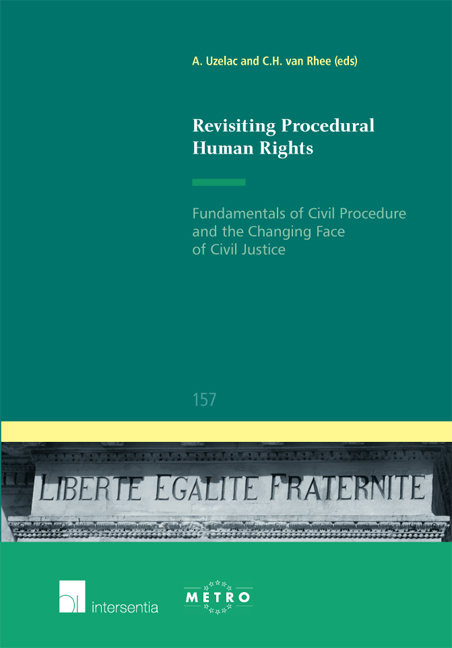 Revisiting Procedural Human Rights
Revisiting Procedural Human Rights Book contents
- Frontmatter
- Table of Contents
- List of Authors
- List of Abbreviations
- Acknowledgements
- Introduction
- The Human Right to Accessible and Foreseeable Justice
- Fundamental Procedural Rights from a National Angle
- Wheels of History: Fair Trial Rights in Historical Perspective
- Equal Justice for all: Empirical and Normative Approaches to Legal Aid and Assistance in Civil and Administrative Cases
- The Paradox of Access to Justice ‒ Empirical Research into the Attitude of the Cantonal Judge Towards Unrepresented Parties in Dutch Civil Procedure
- Access to Justice in Administrative Cases. An Analysis of Cases of the Zagreb Legal Clinic
- Are Financial Burdens Preventing Access to Justice in Southeast European Judicial Systems?
- Ius Commune Europaeum
Access to Justice in Administrative Cases. An Analysis of Cases of the Zagreb Legal Clinic
from Equal Justice for all: Empirical and Normative Approaches to Legal Aid and Assistance in Civil and Administrative Cases
Published online by Cambridge University Press: 13 October 2018
- Frontmatter
- Table of Contents
- List of Authors
- List of Abbreviations
- Acknowledgements
- Introduction
- The Human Right to Accessible and Foreseeable Justice
- Fundamental Procedural Rights from a National Angle
- Wheels of History: Fair Trial Rights in Historical Perspective
- Equal Justice for all: Empirical and Normative Approaches to Legal Aid and Assistance in Civil and Administrative Cases
- The Paradox of Access to Justice ‒ Empirical Research into the Attitude of the Cantonal Judge Towards Unrepresented Parties in Dutch Civil Procedure
- Access to Justice in Administrative Cases. An Analysis of Cases of the Zagreb Legal Clinic
- Are Financial Burdens Preventing Access to Justice in Southeast European Judicial Systems?
- Ius Commune Europaeum
Summary
Introduction
In Croatia, the present system of free legal aid services, which includes legal aid clinics, is relatively new. The Zagreb Legal Clinic (founded in 2010) is one of the providers of free legal aid in Croatia. Its work is regulated by the Croatian Legal Aid Act (CLAA), the Regulation on Studies and by its statute. Legal clinics are entitled to provide primary legal aid, namely general legal information, legal advice, draft submissions to government agencies, the ECtHR and other international organisations in accordance with international agreements and rules of procedure, provide representation in proceedings before government agencies, and legal assistance in the peaceful resolution of disputes outside of the courts (Article 9 CLAA).
Students of the Zagreb Faculty of Law involved in the work of the Clinic are organised in several groups, each group dealing with a specific legal area. This contribution focuses on administrative law cases. Clients can seek legal advice regarding public administration matters at three different stages: before the beginning of the administrative procedure, during the proceedings and after the proceedings are completed.
Cases where clients seek legal advice before the beginning of the procedure reflect insufficient or inappropriate regulation in the area of administrative law. They may also reflect the level of the citizen's awareness of his or her rights and obligations. Cases where clients come to the Clinic during administrative proceedings show that they are not satisfied with the work of administrative bodies. These cases include violations of reasonable time, which is a standard created by the European Court of Human Rights (ECtHR). These cases could also indicate the malfunctioning of legislation. Where clients seek free legal aid after the proceedings are completed, this may pinpoint faulty regulation and problems regarding the execution of administrative acts.
The aim of this contribution is to point out the weak elements in the organisation of public administration in Croatia and access to administrative justice through an analysis of cases of the Zagreb Legal Clinic. This approach may provide three important research results: (1) pinpoint legal areas in which violations of procedural human rights occur the most; (2) show where proceedings lasted too long, and thus in direct violation the reasonable time requirement; (3) reveal the level of compliance of access to justice in Croatia with the minimum standards as established by the ECtHR in respect of Article 6(1) of the European Convention on Human Rights.
- Type
- Chapter
- Information
- Revisiting Procedural Human RightsFundamentals of Civil Procedure and the Changing Face of Civil Justice, pp. 307 - 316Publisher: IntersentiaPrint publication year: 2017


